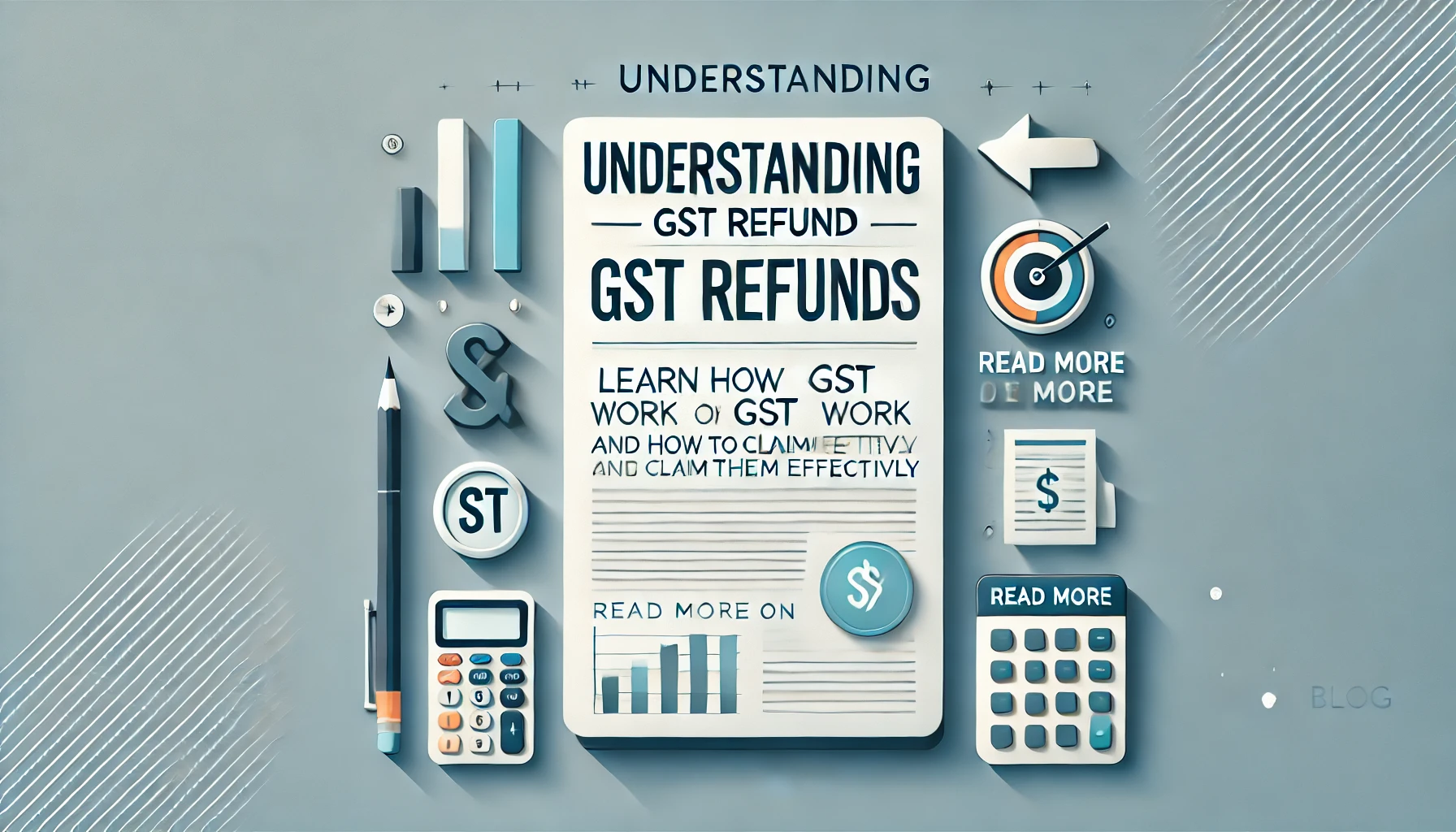Table of Contents
The Goods and Services Tax (GST) system has introduced several provisions aimed at improving tax compliance and transparency. One of the most crucial aspects of GST is the concept of refunds, which can be claimed by taxpayers in specific circumstances. In this blog post, we’ll break down everything you need to know about GST refunds, from the definition to the processes involved.
What is a GST Refund?
In simple terms, a GST refund is the repayment of excess tax paid to the government. Under the GST regime, there are situations where a taxpayer may pay more tax than required. These excess amounts can be refunded either from the electronic cash ledger or as unutilized input tax credit (ITC).
According to Section 54 of the CGST/TSGST Act, a refund can arise in the following cases:
- Excess balance in the electronic cash ledger, which was claimed in the returns.
- Unutilized ITC on account of:
- Zero-rated supplies made without payment of tax.
- Accumulation of ITC due to a higher tax rate on inputs than on output supplies (excluding nil-rated or fully exempt supplies).
- Tax paid by specialized agencies of the United Nations, foreign consulates, or embassies on inward supplies.
Situations When Unutilized Input Tax Credit (ITC) Can Be Refunded
One of the most commonly misunderstood aspects of GST refunds is the unutilized ITC. A taxpayer can claim a refund of accumulated ITC in the following situations:
- Zero-rated exports: If a taxpayer exports goods or services without payment of tax, they can claim a refund of the ITC accumulated on inputs used for exports.
- Inverted duty structure: If the tax rate on inputs is higher than the tax rate on output supplies (except for nil-rated or exempt supplies), the taxpayer can claim a refund of the accumulated ITC.
Note: No refund of unutilized ITC is allowed if the exported goods are subject to export duty or if the taxpayer has availed of a duty drawback for central tax or claims a refund of integrated tax paid on exports.
Can You Get a Refund at the End of the Financial Year?
Many taxpayers wonder if they can get a refund for unutilized ITC at the end of the financial year. The answer is no. There is no provision in GST law for the refund of unutilized ITC at the year’s end. Instead, the unutilized ITC will be carried forward to the next financial year.
Mistaken Payment of Taxes: How to Adjust or Get a Refund
If a taxpayer mistakenly pays CGST/SGST/IGST for the wrong type of supply (e.g., interstate or intrastate), they cannot adjust one tax type against another. However, they are entitled to claim a refund for the wrongly paid tax. This is covered under Section 77 of the CGST/TSGST Act.
Time Limits for Filing GST Refund Claims
There are specific time limits within which a taxpayer must file a GST refund claim:
- Refund Claims: A claim must be filed within two years from the “relevant date” (as per the Explanation to Section 54).
- Provisional Refund: In cases of zero-rated supplies, a provisional refund of 90% of the claimed amount must be granted within 7 days from the date of the acknowledgment of the claim.
Refunds and the Consumer Welfare Fund
If a taxpayer has passed on the tax burden to the consumer, any refund granted will not go directly to the taxpayer but will be credited to the Consumer Welfare Fund under Section 57 of the GST Act.
Can the GST Department Withhold Refunds?
Yes, under certain circumstances, the GST department has the authority to withhold refunds. This can happen if:
- The taxpayer has failed to file returns.
- The taxpayer has outstanding taxes, interest, or penalties that need to be cleared.
- The refund is under appeal, and granting it may affect the revenue due to malfeasance or fraud.
In such cases, the refund may be withheld until these issues are resolved.
Interest on Withheld Refunds
If a refund is withheld, and after an appeal or further proceedings the taxpayer is entitled to a refund, the taxpayer will be entitled to interest at a rate not exceeding 6%. This is covered under Section 54(12) of the GST Act.
Minimum Threshold for GST Refunds
Not all refund claims are processed. If the refund amount is less than ₹1000, the taxpayer will not be eligible for a refund. This is in line with the minimum threshold provision under Section 54(14) of the GST Act.
Refunds for Exporters: Is a Bank Realization Certificate (BRC) Required?
For refunds related to exports, a Bank Realization Certificate (BRC) is not mandatory for the export of goods. However, for export of services, the BRC must be submitted along with the refund claim.
Tax Period vs. Relevant Period for GST Refunds
Refund claims are based on the “relevant period” and not the tax period. For instance, exports may not occur within the same period in which inputs were received and input tax credits were claimed. The concept of “relevant period” allows flexibility in such cases, as it considers the timing of export transactions rather than strictly adhering to tax periods.
Can Refund Claims Be Filed for Multiple Tax Periods?
Yes, exporters have the flexibility to file refund claims for a single calendar month or quarter, or they may choose to club multiple months/quarters together in a single claim. However, the claim cannot span across different financial years.
Can Refund Claims Be Filed Without Filing GSTR-1 or GSTR-3B?
No, GSTR-1 must be filed for the relevant tax period before filing a refund claim. Additionally, a valid GSTR-3B return must also be filed for the last tax period before the refund claim is made.
When is Refund of Accumulated ITC Allowed?
Refund of accumulated ITC is allowed only in the following situations:
- Zero-rated supplies (exports or supplies to Special Economic Zones).
- Under the inverted duty structure, where the ITC accumulates due to a higher tax rate on inputs than outputs.
Conclusion
GST refunds play a vital role in ensuring that taxpayers are not overburdened with excess taxes. Whether it’s a refund due to unutilized ITC, mistaken payment, or export-related refund, understanding the rules and procedures is crucial for efficient tax management. If you’re facing difficulties or have complex refund claims, it’s always advisable to consult a GST practitioner or tax consultant for tailored advice.

Hi, I’m Vishal
Founder of FinTaxExpert.in, with 7+ years of experience in taxation, audits, and corporate finance.
✍️ I’m passionate about writing and researching in the fields of taxation and finance.
📖 Learn more about us at FinTaxExpert.in.

